The 40th International Systemic Functional Congress held at SYSU
Source: School of Foreign Languages
Written by: Yan Xiaoqing, Qiu Qing, Wen Suijun
Edited by: Wang Dongmei
The 40th International Systemic Functional Congress (ISFC40) officially started at Sun Yat-sen University on July 15. Over 300 participants from more than 20 countries attended the congress. Professor Chang Chenguang, Dean of School of Foreign Languages, Sun Yet-sen University, chaired the opening ceremony. The ceremony began with a welcome speech from Professor Huang Guowen, Chair of the executive committee of ISFLA, followed by the launch of the M.A.K. Halliday Library and that of a new international, peer-reviewed journal Functional Linguistics. The launch was chaired by Professor Wendy Bowcher. Professor Chang Chenguang gave a brief introduction to the M.A.K. Halliday Library, and then Professor Halliday and Professor Huang Guowen unveiled the library plaque. This was then followed by congratulatory remarks by Professor Ruqaiya Hasan, Professor David Butt, Professor Fang Yan and Professor Jonathan Webster.
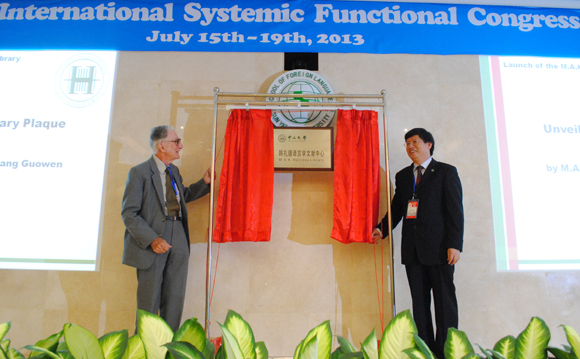
Unveiling of the M.A.K. Halliday Library
The journal Functional Linguistics is sponsored by the M.A.K. Halliday Library and published under the SpringerOpen brand. It publishes scholarly articles and reviews in the broad area of functional studies, with a special focus on systemic functional linguistics. The journal aims to provide a platform for the exploration of language and linguistic issues from a functional and meaning-oriented perspective. Professor Cecilia Colombi, Professor Robin Fawcett, Professor Christian Matthiessen and Professor Geoff Thompson made congratulatory speeches at the ceremony.
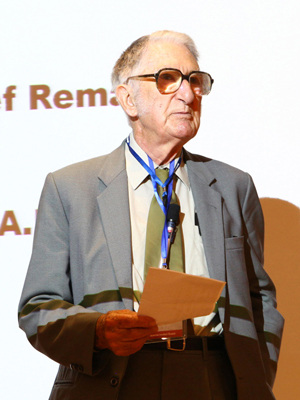
Professor M.A.K. Halliday
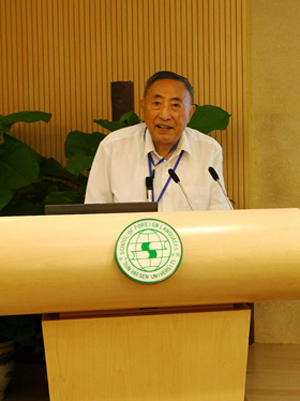
Professor Hu Zhuanglin
The opening ceremony was followed by a speech from the special invited guest, Professor Hu Zhuanglin. After that, Professor Halliday delivered a keynote speech entitled “That ‘Certain Cut’: towards a characterology of Mandarin Chinese”.
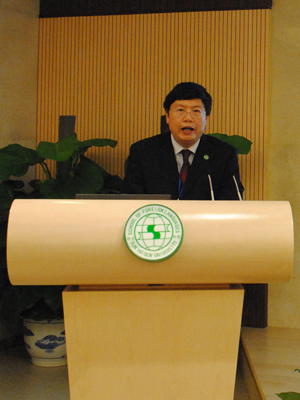
Professor Huang Guowen
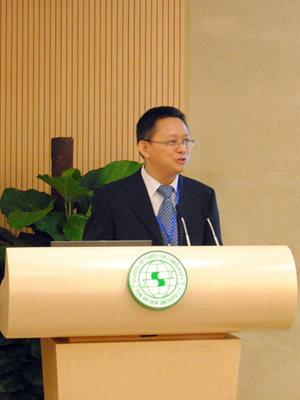
Professor Chang Chenguang
After the parallel sessions in the afternoon, Professor Ruquaiya Hasan gave a plenary speech entitled “The ‘Fixation’ of Meaning in the Linguistic Sign”.
The congress will last till July 19. Apart from plenary speeches, there will also be colloquia, workshops and parallel presentations.
ISFC40 Continued into the Second Day
Today’s program of ISFC 40 comprised three plenary speeches and 39 parallel presentations. The morning sessions began with a plenary speech by Professor Erich Steiner entitled “Empirical Methodologies and Their Alternatives in Translation Studies and Linguistics”. Professor Steiner focused on empirical methodologies and the alternative ones (such as historical and hermeneutic ones) and emphasized the inadequacy of the former and the complementary necessity of the latter.
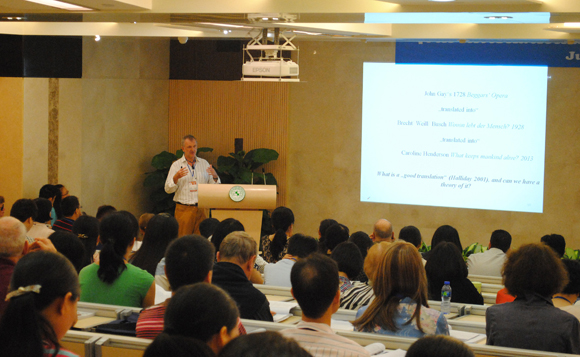
Professor Erich Steiner
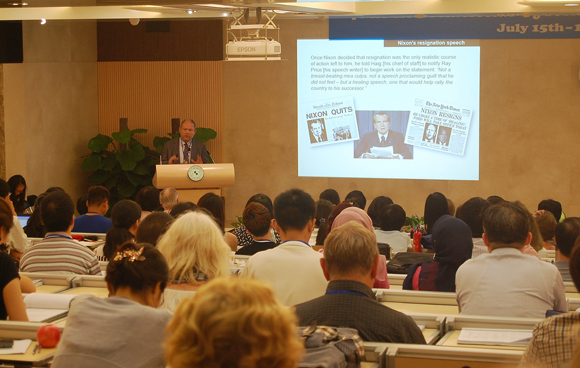
Professor Jonathan Webster
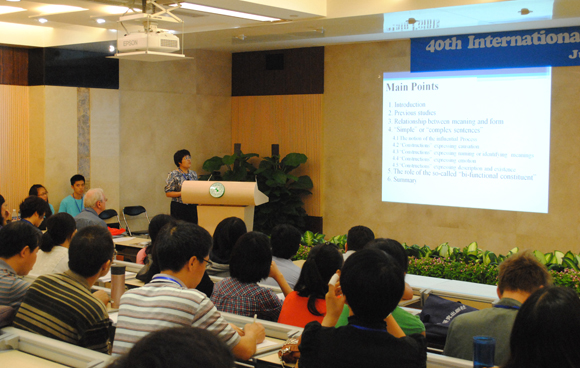
Professor He Wei
In the afternoon session, Professor He Wei delivered a plenary speech entitled “‘Bi-functional Constituent Constructions’ in Modern Mandarin Chinese: A Cardiff Grammar Approach”. She adopted the Cardiff Grammar approach to analyze the Chinese sentences that contain a constituent functioning as both the “object” of the first verb and the “subject” of the second verb, aiming to contribute to the understanding of the nature of this construction. Professor Jonathan Webster in his plenary speech “Analyzing Richard Nixon’s Discourse in Victory and Downfall” applied a functional approach to the analysis of US President Nixon’s second inaugural and resignation speeches, intending to investigate how patterning in both lexis and grammar contributes to texture.
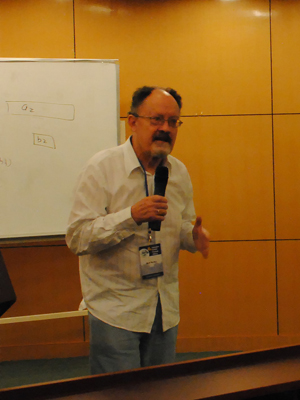
Professor Bob Hodge
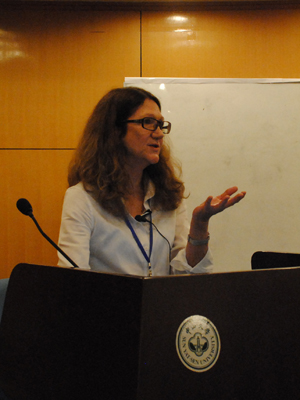
Professor Kay O’Halloran
Parallel sessions involved a wide range of research topics. To name just a few, Professor Huang Guowen analyzed Ku Hung-ming’s English version of Lun Yu. Professor Kay O’Halloran demonstrated a software for analyzing videos of multimodal data. Professor Eija Ventola discussed commodification, globalization and localization of Angry Birds. Professor Michael Cummings analyzed “The Nun’s Priest’s Tale” using appraisal theory and literary stylistics.

Professor Michael Cummings
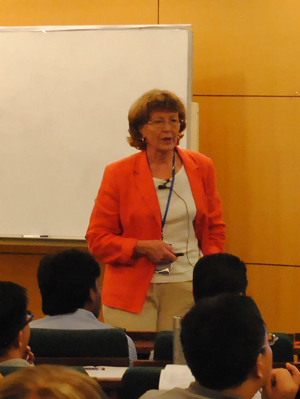
Professor Eija Ventola
Day 3 of ISFC40
Today’s program of ISFC40 comprised two plenary speeches, 39 parallel presentations as well as colloquia and workshops
The morning sessions began with a plenary speech from Professor Cecilia Colombi entitled “Multilingual California: Spanish in the Media”. Based on the theoretical framework of SFL, the analytical tools of evaluation and multimodality, Professor Colombi analyzed the use of Spanish in the public sphere, especially in advertising. By comparing and contrasting those which are targeted specifically at Latinos and those which are designed for the English speaking population, she tried to show how these signs and ads aim at attracting and aligning with different communities that speak Spanish or English.
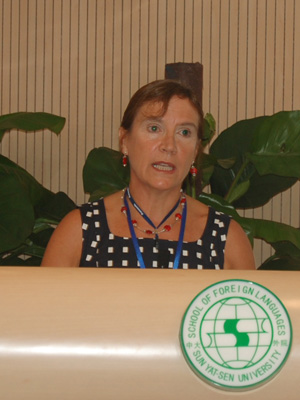
Professor Cecilia Colombi
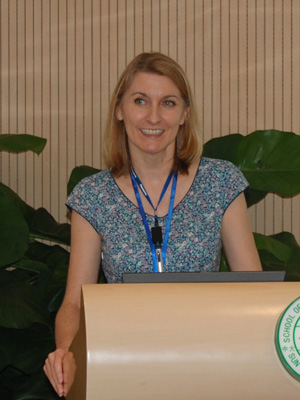
Professor Wendy L. Bowcher
After the parallel presentations in the morning, Professor Wendy L. Bowcher delivered a plenary speech entitled “Context of Situation: Problems, Paths, and Utility”. She introduced the background of context of situation and observed the various issues that arise and which point to the advantages but also the difficulties of putting together a representative set of system networks for context of situation. According to Professor Bowcher, the issues include the concept of ‘semiotic’, the interdependency of the contextual parameters, default dependency relations, representative primary system entry points, sub-system features and environments for more delicate options, the relationship between the material and the semiotic in a situation of language use, multimodality, and the role of ‘iteration’. Professor Bowcher also discussed and illustrated some of these issues and proposed some possible ways of dealing with them through examining a variety of texts/contexts and working through some of the subsystems in the currently available contextualization system networks.
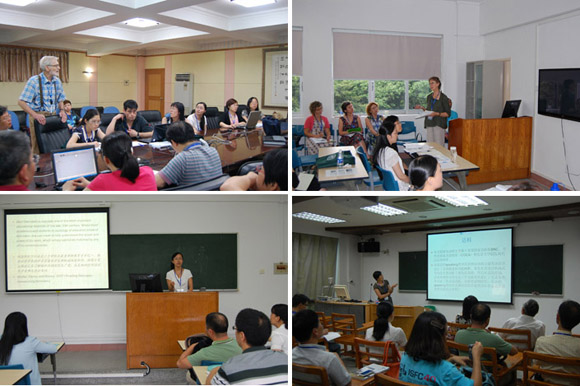
Workshop, colloquia and parallel sessions
The papers presented in the afternoon involved a range of topic areas: multimodality, e-discourse, education, code-switching, genre-based pedagogy, context and register, and corpus tools. The workshop on “Using Corpus Tools to explore intonation in terms of the Eggins and Slade MOVE network” was taught by Professor William Greaves and Meena Debashish. There were two colloquia "Classroom Discourse Studies: SFL in Conversation with Dialogic Teaching" (chaired by Pauline Jones & Jenny Hammond) and "Broadening the Path of Language Education: Complementarities between First and Second Language Contexts" (chaired by Marvin Lam). The afternoon parallel sessions were followed by the Annual General Meeting of ISFLA.

The Annual General Meeting of ISFLA
The China Association of Functional Linguistics also held a question and answer session on Developments of Systemic Functional Linguistics in Lecture Hall 101 in the evening.
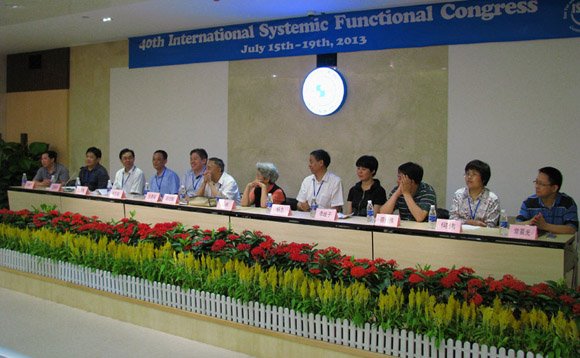
Question and answer session on Developments of Systemic Functional Linguistics
Day 4 of ISFC40
The fourth day of the Congress began with a plenary speech by Professor Geoff Thompson entitled “Seeing double: complementarities of perspective on interpersonal grammatical metaphor”. Professor Thompson first highlighted the commonalities and differences across different areas within interpersonal grammatical metaphor. He explored the ways in which this kind of metaphor impacts on the analysis not only of interpersonal meaning but also of experiential and textual meanings in texts across a range of registers. Professor Thompson also pointed out that users of the language are able to exploit and respond to both the experientialized wording and the interpersonal meaning simultaneously.
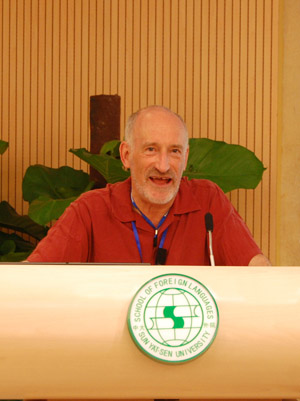
Professor Geoff Thompson
The plenary speech delivered by Professor Randy La Rolla was entitled “Why Systemic Functional Grammar isn’t just for those working in SFG”. He talked about aspects of Halliday’s approach to communication. Professor Randy La Rolla pointed out aspects of Halliday’s approach that have influenced other approaches, and aspects that relate to concepts in other approaches.
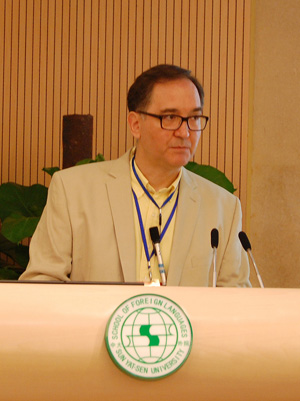
Professor Randy La Rolla
Professor Robin Fawcett’s plenary speech “Forty years back, forty years forward: a brief history of the major concepts and the social structures of Systemic Functional Linguistics, with a look ahead of the future” evaluated the major conceptual developments in SFL and the social structures that have been developed to maintain and nourish the theory. He pointed out that it is important to establish and maintain all these types of infrastructure for the success of a theory. Professor Fawcett hoped that scholars will achieve more successes in establishing SFL as a leading theory in the scientific study of language.
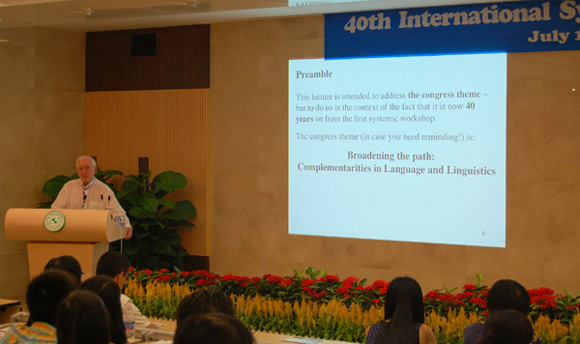
Professor Robin Fawcett
Four workshops were held today: (1) Using Corpus Tools to Explore Intonation in Terms of the Eggins and Slade’s MOVE Network (Professor William Greaves and Meena Debashish), (2) Contexts and Registers through Network Representations: the Textures of Text and of Social Experience (Professor David Butt and Alison Moore), (3) Making Sense of Law: Broadening Pathways through Multidimensional Curriculum Design and Practice (Professor Peter Mickan and Ingrid Winter), and (4) Knowledge Representation Methods of SFG in Natural Language Processing (Li Xuening and Professor Zhang Delu). Topics of parallel sessions include multimodality, genre-based pedagogy, code-switching, e-discourse, grammatical metaphor, context and intonation.
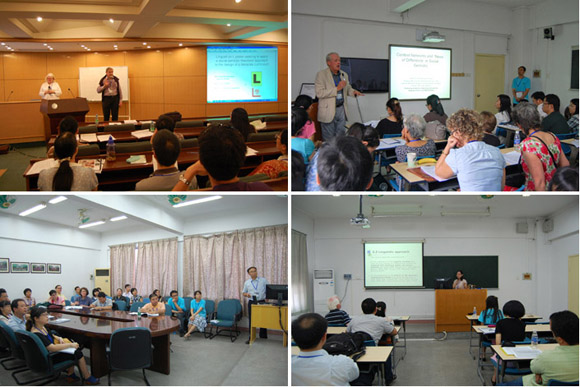
Workshops and Parallel Sessions
Last Day of ISFC40
The final day of ISFC40 began with a plenary speech by Professor Yang Xueyan entitled “Modelling ‘interactivity’ of Teachers’ Questions”. Professor Yang applied SFL to the problem: how to ask question effectively in classroom interaction. She attempted to develop a model to show how interpersonal choices in teachers’ questions work to elicit answers from students. The aim of her research is to offer a framework for analyzing teachers’ questions, and meanwhile to enhance the understanding of what makes 'question’ a truly interactive event.
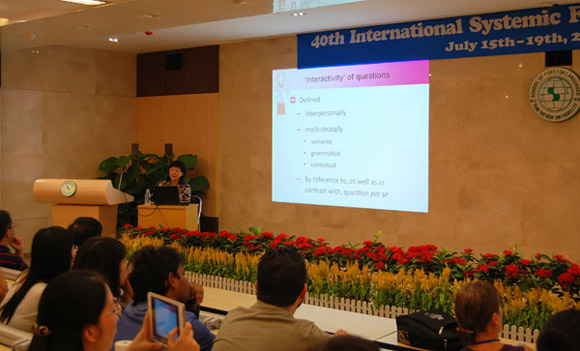
Professor Yang Xueyan
Professor Christian Matthiessen delivered a plenary speech entitled “Registerial Cartography: Context and Semantics”. He gave an interim report on a long-term project concerned with what he called "registerial cartography". Professor Matthiessen proposed that the task in registerial cartography is to map out a region of semantic space in such a way that the features of this region reflect the diversification of context into institutions and, within these, situation types. He presented a context-based registerial map and showed how to use this map to explore the relationship between context and semantics.
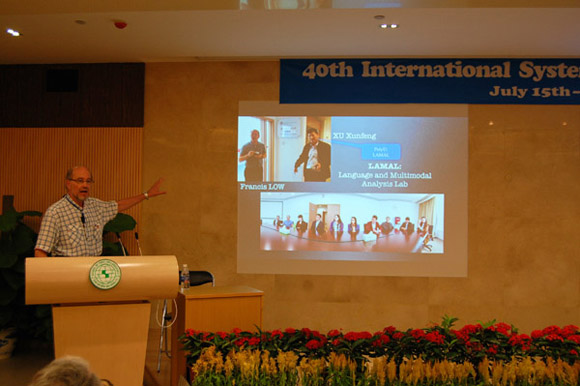
Professor Christian Matthiessen
The parallel session speakers today included prominent scholars such as James D.Benson and William S. Greaves, Zhang Delu, Miao Xingwei, Kazuhiro Teruya, etc. Topics of parallel sessions involved a wide range of research fields within SFL theory.
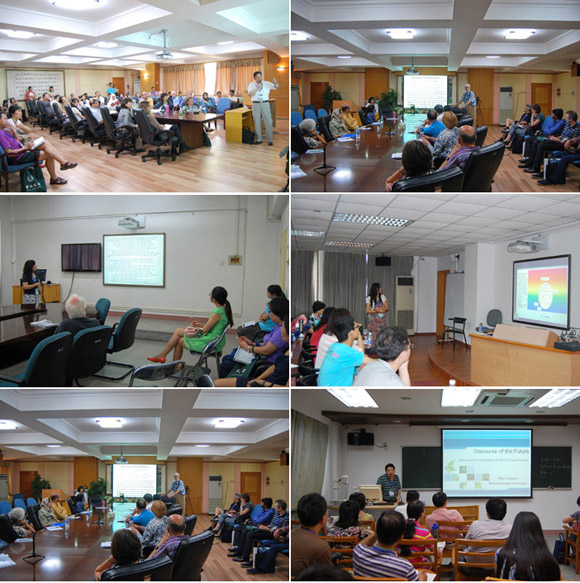
The parallel sessions
The closing ceremony of ISFC40 was chaired by Professor Wendy Bowcher. Professor Chang Chenguang, dean of School of Foreign Languages, Sun Yat-sen University, made a brief summing-up speech, and Professor Huang Guowen, chair of the executive committee of ISFLA gave a closing speech and expressed gratitude to all those who had helped to make this congress a success. Professor Geoff Thompson, the former chair of ISFLA, expressed thanks to the organizers of ISFC40. Finally, Professor Cecilia Colombi introduced the plans for ISFC41 to be held in Mendoza, Argentina in April next year.
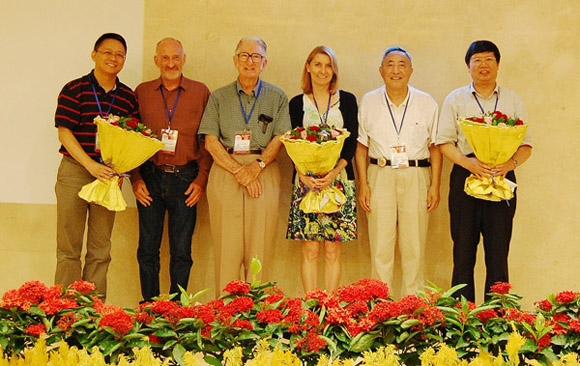
(left to right) Chang Chenguang, Geoff Thompson, M.A.K. Halliday, Wendy Bowcher, Hu Zhuanglin, Huang Guowen
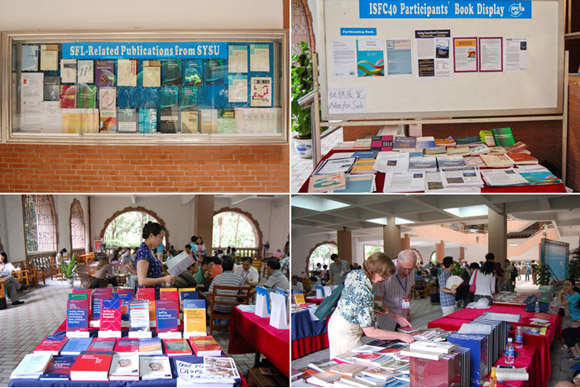
Last Day of ISFC40
